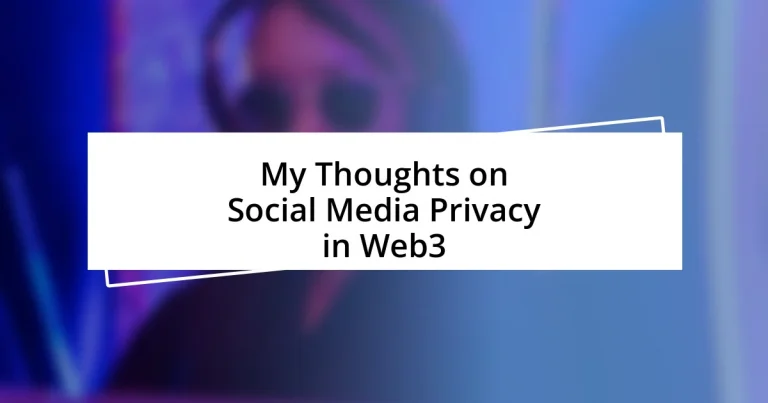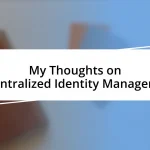Key takeaways:
- Social media privacy requires awareness and responsibility, as shared content can have long-term implications on personal reputation.
- Web3 technology empowers users with decentralization, enhanced security, and transparency, allowing them to control their data actively.
- Despite the benefits of Web3, users must remain cautious of potential risks, such as vulnerabilities in privacy claims and the lack of regulation in the decentralized landscape.
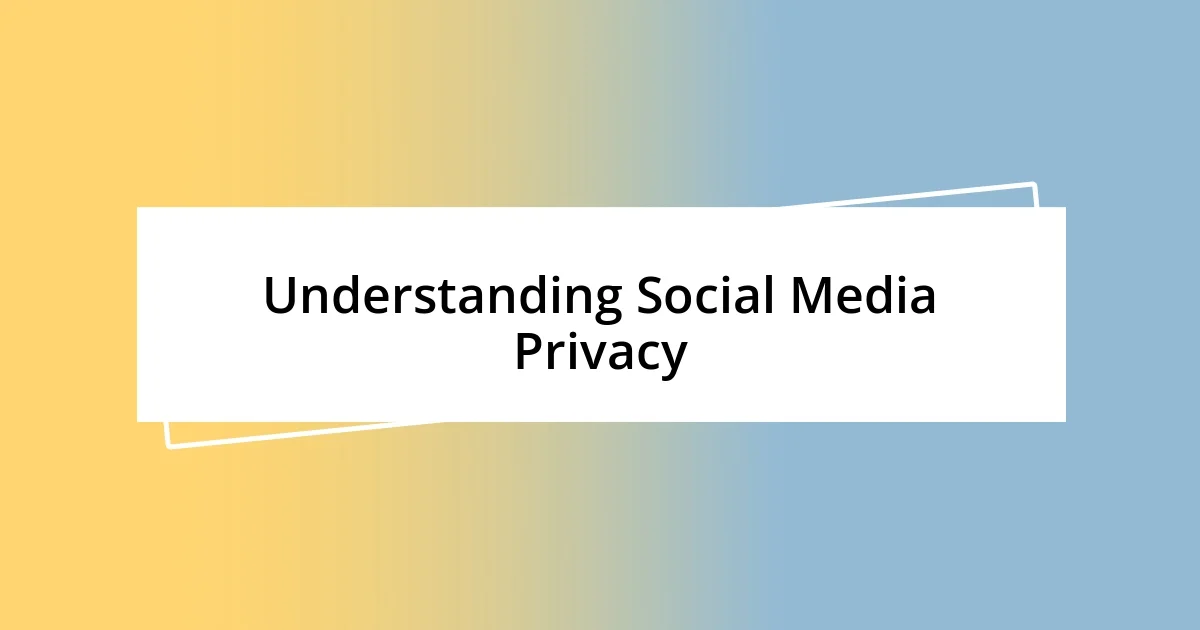
Understanding Social Media Privacy
Social media privacy often feels like walking a tightrope; on one side, we crave connection, and on the other, we fear the exposure that comes with it. I remember a time when I shared a seemingly innocuous photo on a platform, only to discover later that it had been reshared by someone I didn’t know, without my consent. This incident made me question how much control we really have over our personal information in a digital landscape that seems to evolve faster than we can adapt.
When we think about privacy, it’s essential to grasp that what we share can linger online indefinitely, shaping perceptions about us. I once posted a passionate opinion about a controversial topic, only to find that it resurfaced years later during a job application process. This experience taught me that social media is not just a casual space for sharing thoughts—it’s a digital footprint that can follow us through life. How often do we stop to consider who might access our information tomorrow?
Moreover, we often overlook the fine print; the terms and conditions we hastily accept without truly understanding the implications. I can’t be the only one who has felt a twinge of regret after realizing I gave away rights to my content or data without much thought. It begs the question: Are we really aware of how our personal narratives are constructed and shared in this vast digital world? In a way, social media privacy is about taking responsibility for what we put out there and recognizing the long-term impact it might have.
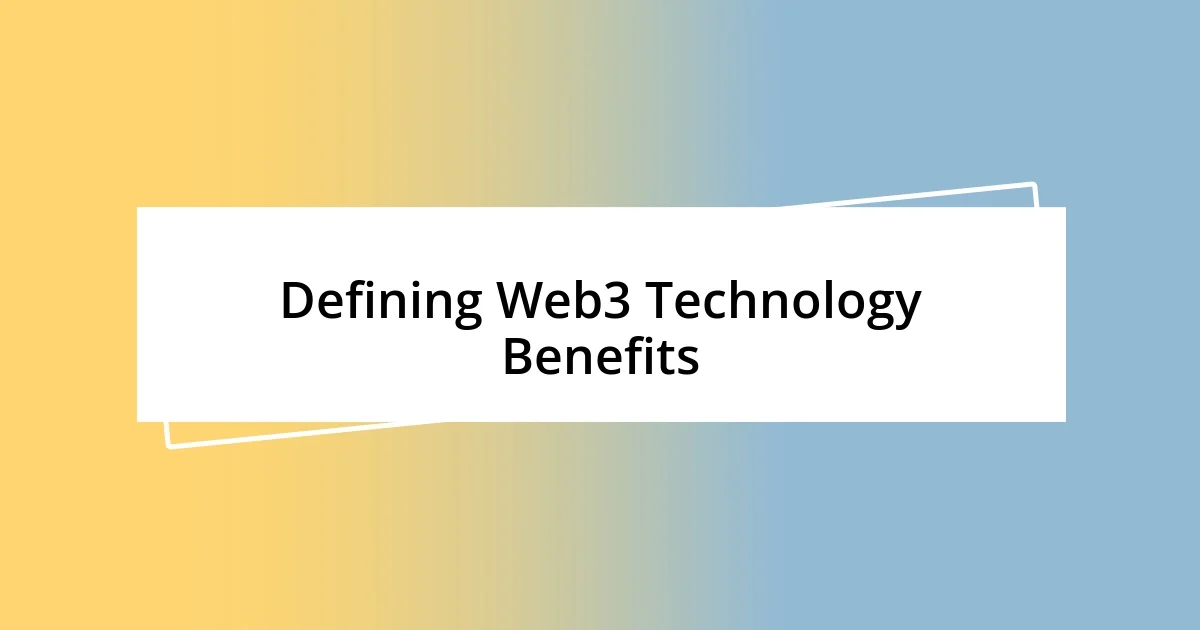
Defining Web3 Technology Benefits
Exploring the landscape of Web3 technology illuminates numerous benefits, particularly concerning user empowerment and privacy. One significant advantage is decentralization; it allows users to have direct control over their data. I recall signing up for a Web3 platform where I felt a renewed sense of autonomy, as I could choose what data to share and with whom, rather than leaving it in the hands of a corporation. This shift can be incredibly empowering for individuals who are wary of how traditional social media platforms manage personal information.
Another notable aspect of Web3 is the enhanced security it offers. The use of blockchain technology helps ensure that interactions are verifiable and tamper-proof. Recently, I experimented with a decentralized social network and appreciated not only the lack of intrusive ads but also the feeling of safety it provided. I couldn’t shake the sense of relief that came with knowing my data wouldn’t be sold to the highest bidder like I experienced previously. It made me ponder how liberating this shift could be for everyone navigating the complexities of social media privacy.
Lastly, Web3 facilitates a transparent ecosystem where users can audit how their data is handled, fostering trust. I remember feeling skeptical about how my data was used in traditional platforms, often questioning the fairness of it all. The transparency offered by Web3 reassured me, as I could follow the exact path of my data. It’s a refreshing change that could redefine how we engage with online communities, instilling a greater sense of accountability among platforms.
| Benefit | Description |
|---|---|
| Decentralization | Allows users to control their data independently from corporations. |
| Enhanced Security | Utilizes blockchain for safe, verifiable transactions. |
| Transparency | Users can audit how their data is utilized, fostering trust. |
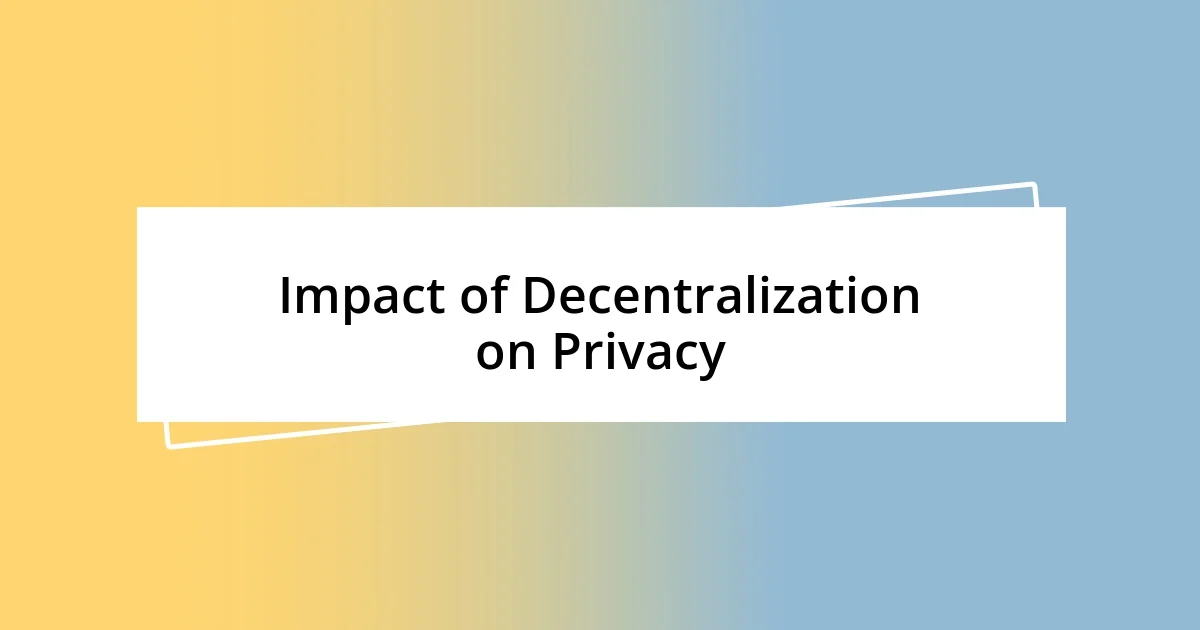
Impact of Decentralization on Privacy
Decentralization significantly transforms our understanding of privacy in the digital space. It’s like flipping the script; instead of placing our trust in a central authority, we now have the power to directly manage our data. I can’t help but feel a sense of excitement when I think about this shift. I remember the anxiety I felt when my information was in a corporation’s hands, wondering how many unseen eyes could access it. With decentralization, it’s empowering to know that I can control who sees my data, a liberating experience I never thought possible in traditional social media.
The implications of decentralization on privacy extend to how we interact online. Through this new framework, users can share and connect without the looming threat of data exploitation by third parties. Consider this: when I joined a decentralized platform, I shared less of my personal information upfront, relying on smart contracts to safeguard my privacy. This creative strategy enabled me to enjoy my social interactions more freely. Here are some key impacts of decentralization on privacy:
- User Empowerment: Individuals have direct control over their personal information, allowing for tailored privacy settings.
- Reduced Data Exploitation: Decentralized systems hinder unauthorized access and selling of user data by corporations.
- Customized Consent: Users can determine and manage their own consent levels for data sharing, enhancing personal agency.
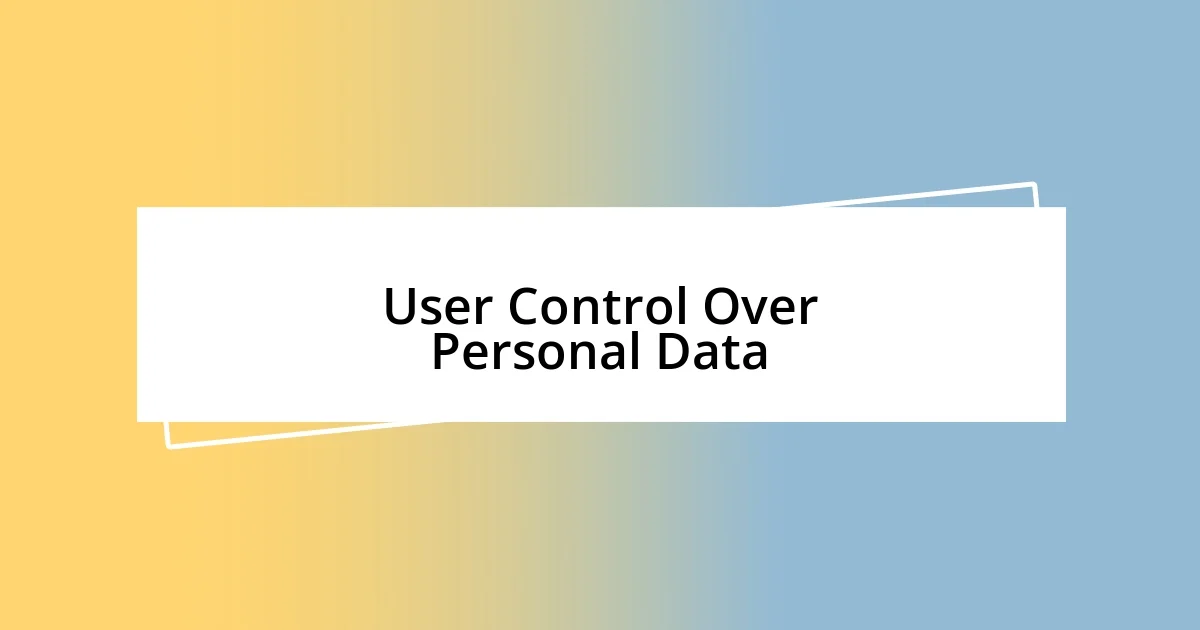
User Control Over Personal Data
User control over personal data in the Web3 landscape is truly revolutionary. I still remember the first time I encountered a platform that let me decide exactly what information I wanted to disclose. It felt liberating to check boxes instead of blindly agreeing to long privacy policies, allowing me to feel more confident about my digital footprint.
When I think about traditional platforms, I often recall the frustration of realizing how little control I had over my data. For instance, when I unknowingly shared personal details that ended up in the hands of advertisers, it left me uneasy. Now, with Web3 technologies, I can actively manage my settings and have the peace of mind that comes with knowing I’m not just another data point to be sold.
Moreover, the customizable consent options in Web3 make the experience even more engaging. I recall experimenting with various platforms and appreciating the granular control over my data sharing. Whether I opted in or out of certain features, it felt like engaging in a serious conversation about my privacy rather than dealing with a faceless corporation. Isn’t it refreshing to truly take the reins on what parts of our lives we choose to share? This level of user agency not only builds trust but ultimately transforms how we interact in the digital world.
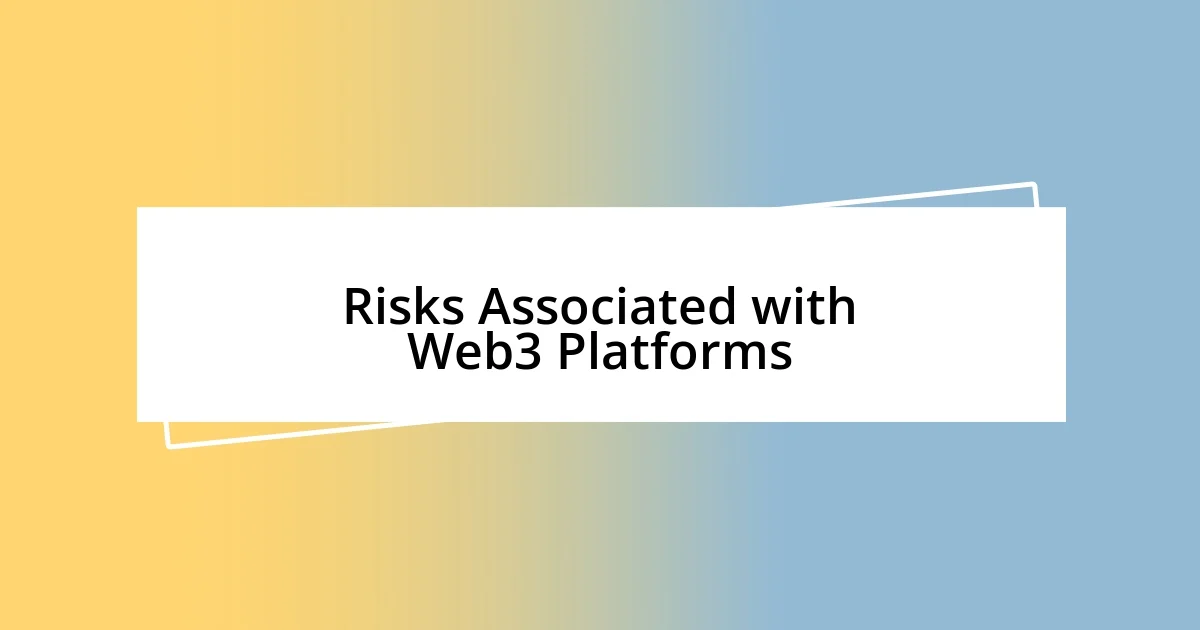
Risks Associated with Web3 Platforms
Navigating the risks associated with Web3 platforms can be tricky. For example, while I appreciate the decentralization that empowers me to control my data, this independence can also lead to vulnerabilities. I once tried a new decentralized social network that promised enhanced privacy, but shortly after joining, I realized some users were still able to see my activity without my consent. It left me questioning whether these platforms really provide the privacy they claim.
Additionally, there’s the issue of smart contracts. They’re designed to execute automatically based on pre-set conditions, but what happens if those conditions are not fully understood? I remember a friend who thought she was participating in a completely private transaction, only to find out later that the terms in the smart contract allowed the network to share certain data points. It was a stark reminder of the importance of not just trusting technology blindly. Have you ever felt that moment of dread when you realize you might be exposed, despite your best efforts?
Lastly, let’s not forget about the overall lack of regulation in the Web3 space. Unlike traditional social media platforms that follow established guidelines, decentralized applications often operate in a gray area. I find myself concerned about the future of accountability and support. If something goes wrong, who do I turn to? This uncertainty can be daunting. In a world where we’re encouraged to take control, it often feels like we’re also taking a leap of faith—one that could have significant implications for our personal privacy.
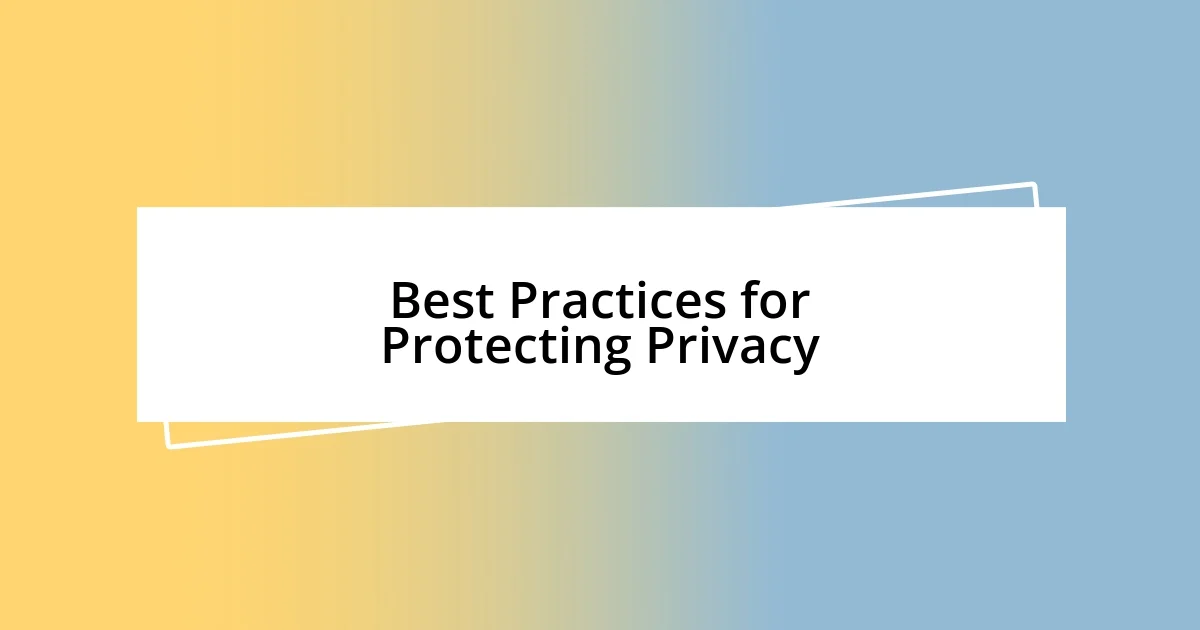
Best Practices for Protecting Privacy
To protect your privacy on Web3 platforms, one of the best practices is to utilize strong encryption for your data. I remember a moment when I encrypted my communications on a decentralized messaging app. The peace of mind I felt knowing my conversations were shielded from prying eyes was unmatched. It’s a small step that can make a world of difference.
Another effective approach is to dive into the privacy settings available on these platforms. Have you ever taken the time to explore your options? I’ll admit, I used to overlook these settings, thinking they were just a standard feature. However, one day I discovered a treasure trove of controls—like the ability to limit who could view my profile and posts. This kind of granular control not only enhances your privacy but also helps curate your online presence in a way that feels authentic to you.
Lastly, it’s crucial to remain vigilant about the information you share, even with platforms that prioritize privacy. I used to be quite open about my interests, but after experiencing an incident where my data was shared without my consent, I became much more discerning. It made me realize that every piece of information is a puzzle piece of my identity. So, before hitting “post,” I always pause and ask myself: “Is this something I want everyone to see?” That simple question can make a significant difference in how I navigate social media in the Web3 space.












